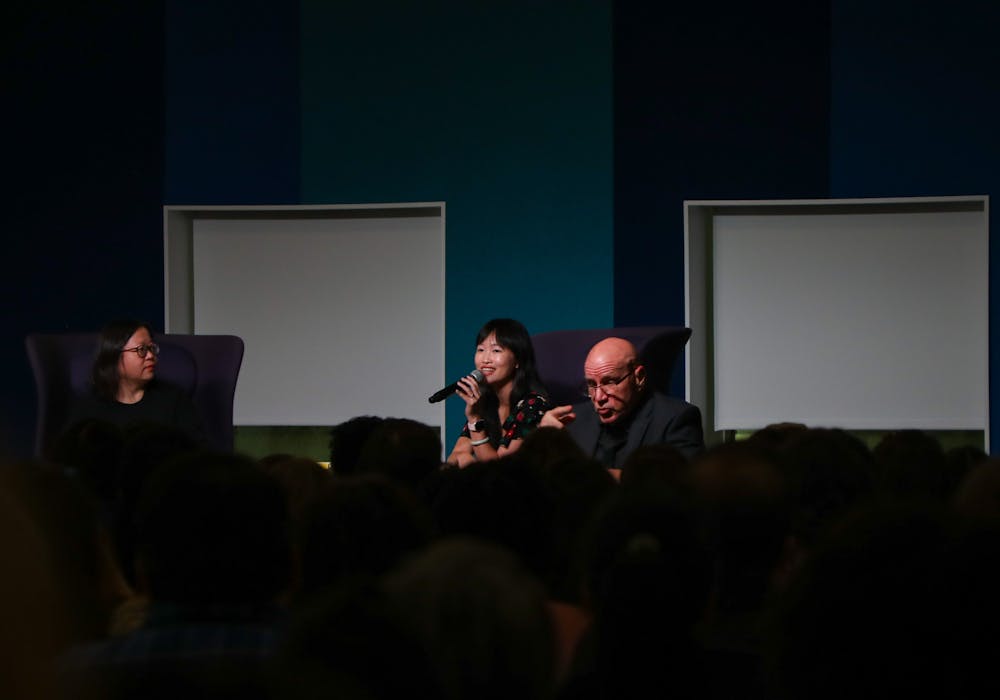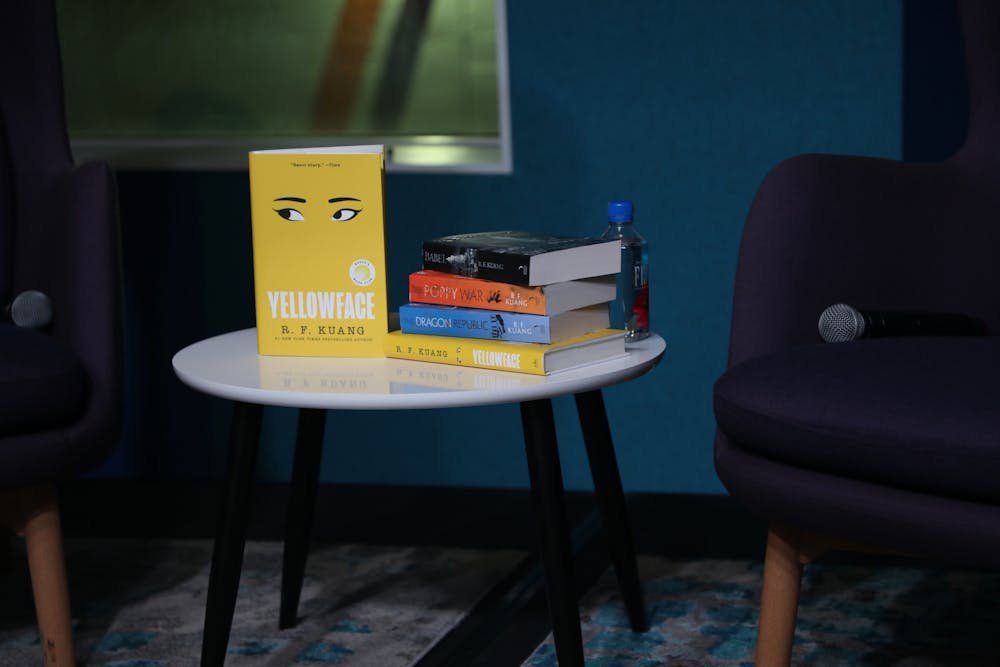It took a while to find parking—from side-streets to filled up library lots, almost all the spots were gone. Groups of students, couples, families hustled across the street, books clutched in the crooks of elbows and tucked inside tote bags as they were ushered through Richland Library, the time tick-tick-ticking to seven. There was a sea of people, but they found seats where they could, waiting with bated breath.
All this hustle and bustle, this waiting and craving was for one woman, one author: R.F. Kuang.

Thanks to Richland Library’s Broader Bookshelf program, Rebecca F. Kuang visited downtown Columbia to discuss two of her most recent novels, "Babel: An Arcane History" and "Yellowface." Moderated by Dr. Jie Guo, an Associate Professor at USC, Kuang spent the majority of the hour answering Guo's questions regarding work ethic, research methods and book-specific inquiries. Near the end of the program, a handful of audience members asked their own questions directly, and the night ended with a reception and a book signing. If attendees were without a novel, copies were sold by employees of All Good Books before and after the program.
As an award-winning #1 New York Times bestselling author, Kuang has five novels tucked under her belt, with an intriguing sixth hitting shelves next August and a seventh currently in the works. But Kuang is far more than an author; she studied at both Cambridge and Oxford, and she’s currently pursuing her PhD in East Asian languages and literatures at Yale. She’s published approximately one novel a year, all while completing her studies and even teaching classes herself.
Between teaching, studying and writing, Kuang dedicates even more time to bulk-loads of research, particularly for novels like “Babel,” a historical narrative ingrained with magic that tackles the breadth of colonialism in 1830s linguistic studies. Kuang acknowledged that she had a lot of ground to cover, though she specifically wanted to tell a story about England's silver trade, translation and the empire those two tiny puzzle pieces built. In the end, Kuang found herself learning with her characters.

“I also basically gave myself the education that the cohort would have had,” Kuang explained. "So when [the main characters] Robin, Ramy, Victoire and Letty are reading about the German Romanticists and translation theory and they were reading Herodotus and they’re thinking about how people have thought about translation for centuries, I took myself through that same intellectual journey.” Writing a novel is just as much of a learning process as reading one, and many authors are often left missing a few pieces. For "Babel," that missing piece was its voice, the essence and its sound. She found it in Austen and Dickens, the cultural and linguistic norms of historical literature, the kind of knowledge one can't find in history books.
“I took all that vocabulary and those colloquialisms and imagery and ways of describing the world, and I put those in my character’s mouths,” Kuang said. “And I think that was the final piece of the research puzzle.” Sometimes, in this writing journey, one must stop and smell the roses or, in this case, pick up a novel.
However, great books aren’t without inspiration, and throughout Kuang’s discussion, she mentioned how certain aspects of her life influence or present themselves in her novels. She worked as a translator the year she started “Babel,” introducing her to the magic and illusion of 'faithful' translations. Guo also inquired about the “global novel,” one that reaches all corners of global thought and global issues, which lead to Kuang discussing how her life as an immigrant shaped her work.
“There's so many authors that can’t help but write global novels because they live global lives,” Kuang stated. Having spent time in both China and America, she is acutely aware of both of their histories and how they've shaped her experiences. She’s gone back and forth between two countries, back and forth between two languages, making her writing affected by this specific, personal reality.

“I could never think of myself as just somebody who occupies a tiny corner of the world and things that are going on on the other side of the planet have nothing to do with me,” Kuang explained. This is no phenomenon—Kuang confirms other writers and translators share similar experiences, but we do see it clearly in the scope of Kuang’s published and unpublished novels.
One of her work-in-progress novels is set in Taipei, and she wrestled with whether or not she should keep dialogue in English despite them speaking Chinese. Ultimately, she decided to experiment with translation, imagining the exchange in Chinese before translating it to English.
“In good translations, I think, they flow beautifully in fluent English, but there's something alien about it,” Kuang said. “You can pick up the pieces of another culture kind of peeking through the text.” Kuang’s background in translation, her history with Chinese language and culture, makes a text like this possible. Innovation is imperative for writers, for the industry as a whole, in order to stay inspired.
And Kuang is certainly not afraid of innovation. From high-fantasy epic, “The Poppy War,” set in mid-20th-century China to magical, historical 1830s London of “Babel” to the modern take on race in the publishing industry in “Yellowface,” Kuang has covered a collection of genres. She compares her narrative shift to shedding her skin for the thrill of a new, creative challenge.
“‘Yellowface’ is a novel about being an imposter and putting on a mask,” Kuang said, “which is funny because I constantly feel like an imposter, and I try on genres and narrative styles, like other people's skin, or masks, I guess, to make it less serial killer-y.” For Kuang, it’s about reinvention, about taking risks, about staying alive as a writer. She never wants to tell the same story, never wants to get bored. After “Yellowface,” she went back in time to the 80s, putting her characters six feet underground—they quite literally go to Hell—for her upcoming novel "Katabasis" and returned to modern day with her following, unnamed book set in Taipei. And she wants this whiplash, wants this tectonic shift from one novel to the next.

“I think if you keep killing yourself and reinventing yourself, then you can't ever get old,” Kuang expressed.
It is still important to stay true to who you are as an author, a theme explored throughout “Yellowface,” a novel about a white woman stealing the work of a dead Chinese-American author and publishing under an Asian-sounding name. When asked about the rise in real-world examples of authors pretending to be a different race, Kuang believes it has something to do with performing for online spaces to harness a perceived cultural advantage.
“There is this strange mythology, this perceived benefit to being marginalized in certain spaces because you're taken more seriously, your voice is valued more, there's a fetish of oppression, et cetera, and people really blow this out of proportion,” Kuang explained. Whether or not there will be more cases of white authors posing as racially ambiguous online remains to be seen, but Kuang believes it's very likely, practically inevitable, thanks to influences like AI and deepfakes.
While "Yellowface" is her only novel set in modern day, it's not her only novel rooted in reality. With one foot in creative writing and the other in scholarly research, Kuang’s connection with upper education is undeniable, especially after the correlation between colonialism and intellectual institutions was explored in “Babel.” Kuang herself explained her love for universities, how they act as this gateway to accessible resources, a back-and-forth trade of thought in seminars, a mentorship, this passing of knowledge—she loves all of it. But she also acknowledges its inherent flaws, that sometimes you can love a broken system.

“When people ask me, ‘How do you square being at a university with the criticism of that university?’—I think it's so cool that knowledge centers like this exist, endowed with so many resources, the part I take issue with is the gates,” Kuang explained. “I think it's horrendous and ethically unjustifiable that so much of this knowledge, these books, these libraries are accessible only to perhaps the dumbest demographic.” And it’s not simply because of inexperience, she goes over an accumulation of reasons from exhaustion to the workload to the number of things a young person could put first over ancient playwrights or an unpaid internship. Kuang believes university shouldn’t be a one-time experience but an ongoing process, that classes and lectures should be more accessible to the general public.
And, just past that 8 p.m., Kuang ended the night with a bridge, one connecting academia with the general public: “My attitude to my time at Yale is to take all the learning I can get, take all the resources I can get, and then send them back out into the world, right? Do library programming like this, to host reading groups, and wherever I end up teaching, and whatever institution I'll be at—like my project really is to break down the divide between the university and the community, and if that's not happening at the university, then it has to happen at the public library."



